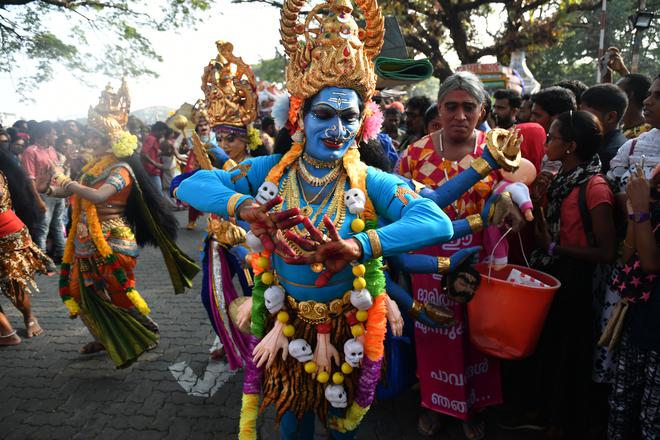Fort Kochi, the quaint port town with its colonial era bungalows and benevolent banyan trees in Kochi, is set for its grandest celebration of the year, the Cochin Carnival. Drawing revellers from all parts of the State and outside, the carnival, which began on December 11, has a train of events running up to the burning of the Pappanji on December 31 midnight.
The Pappanji is the effigy of an old man (which can go up to 60 feet in height) , which is set ablaze on New Year’s Eve to signify the passing of a year and the beginning of a new one. The tradition is believed to be a remnant of the Portuguese way of welcoming a new year. (The Portuguese ruled Cochin from 1503 to 1663).
Cut to 2023, the days in Fort Kochi are packed with sporting events such as beach football, volleyball, motorbike racing, kayaking, wrestling, rowing, angling, cross-country race, to mention a few. The evenings are filled with music, dance and other cultural programmes. .
“This is the best time to be in Fort Kochi,” says social activist Jaison Cooper from Mundamveli (a town close to Fort Kochi), who has been a regular attendee of the carnival. “For people like us from the region, the carnival is a much-anticipated event. Almost every household would be out on the streets on December 31 and would congregate on the Fort Kochi beach at midnight to see the burning of the Pappanji,” he says.


The Cochin Carnival began in 1984 when three young people from Fort Kochi — George Augustine Thundiparambil (Roy), Ananda Felix Scaria (Ananda Surya) and Antony Anoop Scaria ) — decided to organise a public event to celebrate the signing of a UN proclamation declaring 1985 as the International Youth Year. They roped in youth clubs in the region, who pitched ideas and, gradually, it developed into a veritable carnival with colourful processions, including Kerala’s folk and ritualistic art forms, dance, music and tableaux. Bike races and local games and sports were held along the Kochi beach. “Into its 40th edition, the carnival has grown in scale and scope and still retains its character of being a secular, multicultural festival,” says Sohan K J, former mayor of Kochi, and an office bearer of the Cochin Carnival committee.
“One of the events, a rangoli competition, is held in the precincts of the Marathi temple in Mattanchery. On this day, the temple is open to every participant, including non-Hindus. This shows the true spirit of the carnival,” he adds.
On January 1, Fort Kochi will burst into a riot of colours as brilliantly costumed people, tableaux, dancers, jugglers, folk artists, masqurades, bands and martial artists will take to the festooned streets in a final carnival parade.
The carnival is on till January 1.
(Some of the events require registrations. Log on to cochincarnival.org).
A sneak peak into the country’s biggest events and festivals before they happen. So, you want to travel more? Watch this space.







